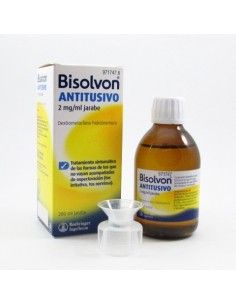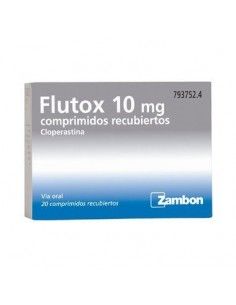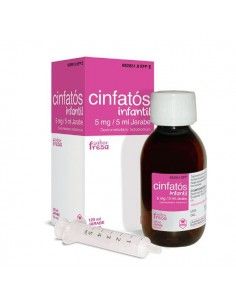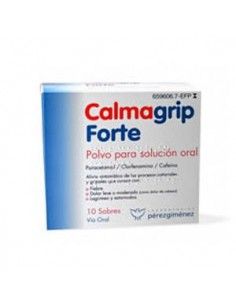Flutox 3.54 mg/ml syrup 120 ml
- ANTITUSSIVE], [HISTAMINERGIC ANTAGONIST (H-1)]. Cloperastine has an ethanolamine structure which relates it to other H1-antihistamines. It has antitussive effects, although its mechanism of action is not established. Cloperastine may have central effects, inhibiting the cough centre, although its bronchodilator and local anaesthetic activity may potentiate the effects.
The effects appear after 20-30 minutes, and last for about 3-4 hours.
Indications
- DRY COUGH]. Symptomatic treatment of unproductive cough of any aetiology.
Posology
Dosage:
- Adults, oral: 10-20 mg/8 hours or 10 ml/8 hours.
- Children, oral:
* Children and adolescents over 12 years of age: 10 ml/8 hours.
* Children aged 6-12 years: 5 ml/8 hours.
* Children between 2-5 years: 2.5 ml/8 hours.
* Children under 2 years of age: Proportionally lower doses.
Guidelines for correct administration
Cloperastine should preferably be administered before meals.
The syrup should be shaken before administration.
It is advisable to drink plenty of water (1-2 litres per day) during treatment.
Contraindications
- Hypersensitivity to any component of the medicinal product.
Warnings about excipients:
- This medicinal product contains sucrose. Patients with hereditary [FRUCTOSE INTOLERANCE], glucose or galactose malabsorption, or sucrase-isomaltase insufficiency should not take this medicinal product.
Precautions
- Patients suffering from [GLAUCOMA], [PROSTATIC HYPERPLASIA] or [URINARY BLADDER OBSTRUCTION], [ARTERIAL HYPERTENSION], [CARDIAC ARRHYTHMIA], [SERIOUS MYASTHENIA], stenosing [PEPTIC ULCER] or [INTESTINAL OBSTRUCTION] with oesophageal, intestinal or bladder involvement. Due to the anticholinergic effects of cloperastine, aggravation of these conditions may occur, and it is therefore recommended that extreme precautions be taken and treatment discontinued in the event of worsening.
- Persistent cough. Extreme precautions are recommended in patients with chronic cough, such as that accompanying smoking, [PULMONARY INSICKLE], [ASTHMA], or in the case of [PRODUCTIVE Cough], due to the fact that by inhibiting the cough reflex, it could alter expectoration and increase the resistance of the respiratory tract. In addition, due to the anticholinergic effects, the volume of bronchial secretion may be reduced, increasing its viscosity and worsening these conditions. A doctor should be consulted if the cough persists for more than a week, or if it is accompanied by high fever, skin rash or persistent headache.
Warnings about excipients:
- Because it contains methyl parahydroxybenzoate it may cause allergic reactions (possibly delayed).
Warnings about excipients:
- Containing propyl parahydroxybenzoate may cause allergic reactions (possibly delayed).
Advice to patients
PATIENT ADVICE:
- It is recommended to administer this medicinal product before meals.
- It may cause drowsiness, so caution is recommended when driving, and not to be combined with drugs or other sedative substances such as alcohol.
- Patients undergoing treatment with sedative drugs are not advised to self-medicate with cloperastine products without consulting a doctor.
- Patients with glaucoma or urinary retention should notify their doctor before starting treatment.
- If after a one-week treatment period the cough continues or is accompanied by severe headache, fever or rash, a doctor should be consulted.
Interactions
- Ethyl alcohol. The combined administration of alcohol and H1-antihistamines may potentiate the sedative effects of both substances. It is recommended to avoid alcohol consumption during treatment.
- Anticholinergics (antiparkinsonian drugs, tricyclic antidepressants, MAOIs, neuroleptics). The administration of cloperastine together with other anticholinergic drugs could potentiate the anticholinergic effects, so it is recommended to avoid the association.
- Expectorants and mucolytics. Inhibition of cough reflex could lead to lung obstruction in case of increased volume or fluidity of bronchial secretions.
- Sedatives (opioid analgesics, barbiturates, benzodiazepines, antipsychotics). Co-administration of an antihistamine together with a sedative drug could potentiate the hypnotic action. Extreme caution is recommended.
Pregnancy
No teratogenic or foetotoxic effects have been reported in animal studies. Adequate and well-controlled studies in humans have not been performed, therefore the use of this medicinal product is only acceptable when the benefits outweigh the possible risks.
Breast-feeding
It is not known whether cloperastine is excreted in breast milk, and the possible effects this may have on the infant. However, previous experience suggests that children, particularly infants and preterm infants, are particularly sensitive to the adverse effects of antihistamines, and it is therefore recommended that breast-feeding be discontinued or the administration of this medicinal product avoided.
Children
Although no studies have been conducted in young children with cloperastine, this drug has been widely used for the treatment of cough in children. Extreme caution is advised as children may be particularly sensitive to the anticholinergic adverse effects of this drug.
Elderly
The elderly are more sensitive to the adverse effects of antihistamines, such as dizziness, sedation, confusion, hypotension and hyperexcitability, as well as anticholinergic effects (dry mouth, urinary retention, glaucoma precipitation). Antihistamines can be used in patients over 65 years of age, but extreme caution should be exercised. If side effects persist or are severe, discontinuation of treatment is advised.
Effects on driving
Cloperastine may substantially affect the ability to drive and/or operate machinery. Patients should avoid operating dangerous machinery, including automobiles, until they are reasonably certain that they are not adversely affected by drug treatment.
Adverse reactions
Side effects of cloperastine are usually mild and transient, being more frequent during the first days of treatment and at high doses. The most common adverse reactions are:
- Digestive. [Nausea], [VOMITING], [STRESS] or [DRY MOUTH]. These symptoms may be reduced by reducing the dose.
- Neurological/psychological. SOMNOLENCE] is common.
- Respiratory. [BRONCHIAL HYPERVERVISCOSITY]; sometimes an increase in the viscosity of bronchial secretions may occur, which may make breathing difficult.
- Ocular. [BLURRED VISION].
Overdose
Symptoms: In case of severe overdose, respiratory depression may occur.
Treatment: Treatment should consist of the usual measures to promote elimination of the drug, with gastric lavage.
If absorption has already occurred, symptomatic treatment should be started, correcting possible acidosis and electrolyte loss. If excitability appears, sedative drugs should be administered.























